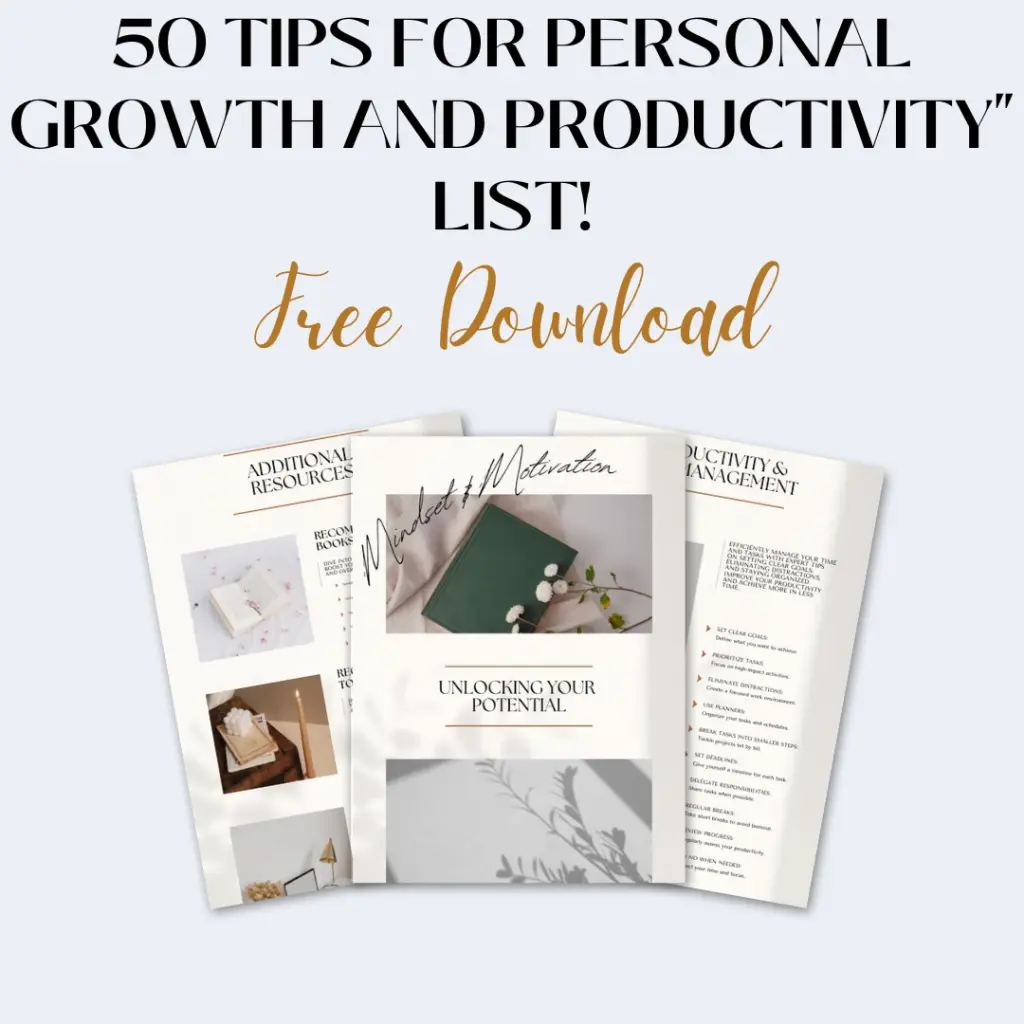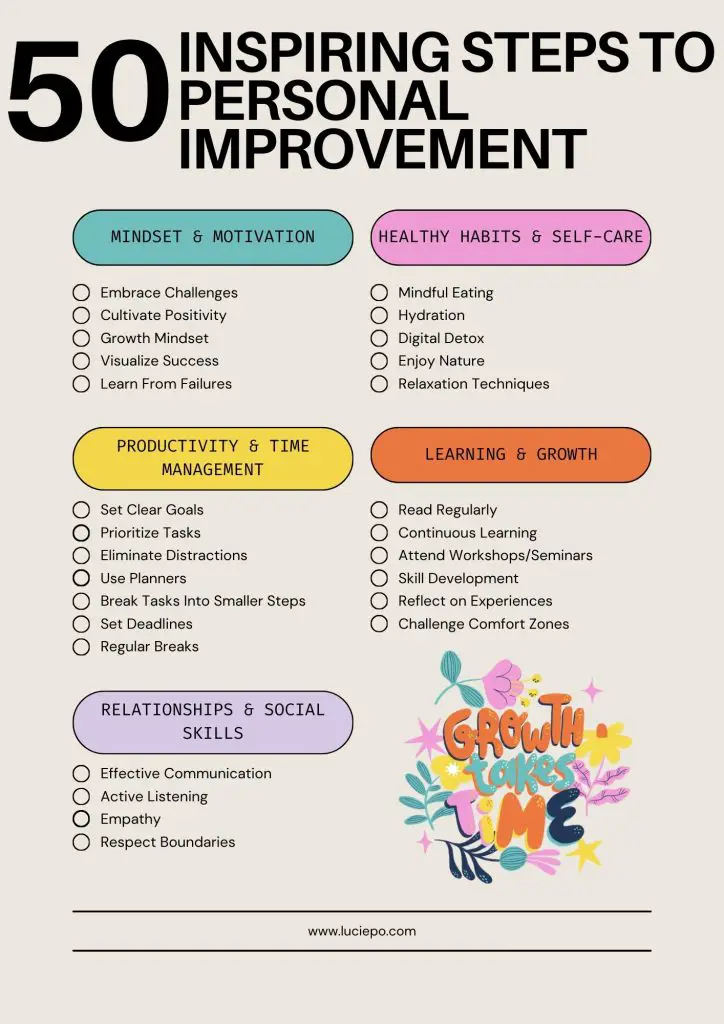
Amélioration de soi Comment commencer : 50 étapes inspirantes à franchir
Avez-vous déjà eu l’impression que vous n’étiez qu’à quelques pas d’une vie plus heureuse, plus saine et plus productive ? Eh bien, vous n’êtes pas seul. Nous sommes tous sur ce chemin de l’amélioration de soi ensemble, et devinez quoi ? C’est passionnant !
Ce billet est consacré aux changements réels et durables. Nous parlons ici du type de développement personnel qui ajoute de l’éclat à votre routine quotidienne et vous permet de vous réjouir des petites victoires. Qu’il s’agisse de prendre de bonnes habitudes, d’apprendre quelque chose de nouveau ou simplement de trouver un peu plus de joie dans le quotidien, j’ai dressé une liste de 50 étapes inspirantes pour vous aider à vivre votre vie au mieux.
Alors, allons-y. Rien de superflu, rien de superflu – juste une bonne dose d’inspiration pour donner le coup d’envoi de votre transformation.
Êtes-vous d’accord ?
Faisons en sorte que cela se produise !

Ready to Elevate Your Life? Download My FREE Guide Now! 🌟
As you dive into this article, I want to empower you with even more tools to enhance your personal growth and productivity. That’s why I’m offering you my exclusive FREE guide with 50 actionable tips.
Don’t miss out on this opportunity to supercharge your journey.
Download Now and embark on a transformation like never before!
Mindset and Motivation
Consider your brain a muscle that gets stronger with every new challenge. When you’re up against something tough, remind yourself that it’s just an opportunity to get mentally fitter.
- Embrace Challenges
- Life’s challenges are opportunities for growth and learning. For instance, when facing a complex project at work, rather than feeling overwhelmed, view it as a chance to develop new skills or improve existing ones. Overcoming such challenges not only boosts your skills but also your confidence.
- Example: Facing a difficult work project and using it as an opportunity to learn new skills.
- Cultivate Positivity
- Positivity can significantly influence your mental health and outlook on life. Start each day by writing or saying out loud three positive affirmations. This practice helps shift your focus from what you lack to what you have, fostering gratitude and a positive mindset.
- Tip: Write down three positive affirmations each morning to start your day with a positive outlook.
- “I am capable of overcoming any challenges that come my way.”
- “I possess the qualities needed to be extremely successful.”
- “My thoughts and actions are creating a positive and fulfilling life for me.”
- Growth Mindset
- Adopting a growth mindset means believing in the potential for intelligence and abilities to grow. Reflect on a past challenge you overcame. Identify how your efforts, strategies, and learning contributed to your success, reinforcing the belief in your capability to grow.
- Practical Exercise: Reflect on past success and identify the growth mindset traits that helped you achieve it.
- Visualize Success
- Visualization is a powerful tool. Spend a few minutes each morning imagining yourself achieving your goals. This practice not only motivates but also helps you identify the steps needed to make those visions a reality.
- Example: Spend 5 minutes each morning picturing yourself achieving a specific goal.
- Stay Curious
- Curiosity keeps the mind active and open to new possibilities. Challenge yourself to learn something new each week, be it a simple skill, an interesting fact, or a new hobby. This habit ensures continuous personal growth and keeps life interesting.
- Practical Tip: Set a weekly goal to learn something new, whether it’s a fact, a skill, or a hobby. If you need help with setting goals that are actually achievable, check out my blog post HERE.
- Self-Compassion
- Being kind to yourself, especially during tough times, is crucial. Whenever you’re feeling down, write a letter to yourself from the perspective of a supportive friend. This exercise helps you view your situation more objectively and with kindness.
- Exercise: Write a letter to yourself from the perspective of a supportive friend.
- Seek Inspiration
- Regularly exposing yourself to motivational content can keep your spirits high. Dedicate time each week to reading inspirational blogs, listening to podcasts, or watching TED talks. This habit can provide new perspectives and keep you motivated.
- Tip: Follow inspirational blogs or podcasts and allocate time each week to engage with this content.
- Affirm Your Values
- It’s important to ensure your actions align with your personal values. Create a chart of your core values and regularly review it to check if your life and decisions are in sync with these values. This practice helps maintain integrity and authenticity in your actions.
- Exercise: Create a personal values chart and review it monthly to ensure your actions align.
- Learn from Failures
- Every setback has a lesson to offer. Instead of dwelling on the disappointment, analyze the situation to understand what went wrong and how it can be corrected. This approach turns failures into valuable learning experiences.
- Tip: After a setback, jot down what you learned and how you can apply this knowledge in the future.
- Embrace Change
- Change is inevitable and often a gateway to personal growth. Embrace it by trying out new activities, taking on different responsibilities at work, or adjusting your routine. These changes, though initially uncomfortable, can lead to significant personal development.
- Example: Taking up a new hobby or responsibility at work to adapt to change.

Healthy Habits & Self-Care
These practices empower you to nurture your well-being, fuel your energy, and optimize your daily routines.
- Regular Exercise: Your Daily Dose of Energy
- Exercise isn’t just about fitness; it’s your secret weapon for energy and mood enhancement. Forget the notion that it’s all about the gym; it’s about movement in any form that brings you joy. Dancing to your favorite tunes while cooking or taking a brisk walk while listening to an audiobook can be just as effective.
- Tip: Create a ‘move more’ playlist with songs that make you want to dance or walk faster.
- Mindful Eating: A Symphony of Flavors
- Eating mindfully turns each meal into a sensory experience, enhancing your enjoyment and digestion. It’s not just what you eat but how you eat. Try turning off all gadgets during meals and focus on the flavors and textures of your food, imagining you’re a food critic tasting each dish for the first time.
- Practical Exercise: Once a week, eat a meal in silence and truly savor each bite, noticing the subtle differences in flavor and texture.
- Adequate Sleep: Your Nightly Recharge
- Sleep is your body’s time to repair and rejuvenate. Transform your bedroom into a sleep sanctuary with calming scents like lavender, and consider a ‘no electronics’ rule an hour before bed to signal to your body that it’s time to wind down.
- Sleep Ritual: Try journaling or gentle stretching before bed as a way to release the day’s tensions.
- Hydration: The Elixir of Wellness
- Drinking water is vital, but it doesn’t have to be boring. Enhance your hydration habit by infusing water with fruits or herbs for an all-natural flavor boost. This not only makes it more enjoyable to drink but also offers some extra nutrients.
- Hydration Hack: Set a timer every hour as a reminder to take a few sips of water, keeping your body consistently hydrated throughout the day. (I use TickTick app for that. Read my blog post to learn how I set it up).
- Meditation & Mindfulness: Your Mental Oasis
- Meditation and mindfulness are like mini-vacations for your mind. They can be as simple as focusing on your breath for a few minutes or practicing gratitude. Try starting your day with a five-minute mindfulness exercise, focusing on something you’re grateful for, to set a positive tone for the day.
- Mindful Moment: During your day, pause for a ‘mindful minute’ to take deep breaths and ground yourself in the present.
- Digital Detox: Unplug to Recharge
- In a world where screens dominate, taking a digital break can feel like a breath of fresh air for your mind. Allocate specific times in your day or week when you consciously avoid digital devices. For instance, declare dinner time a phone-free zone or spend the first hour of your morning screen-free.
- Weekend Challenge: Try spending half a day during the weekend completely offline and immerse yourself in a non-digital activity like reading or crafting.
- Enjoy Nature: Your Natural Stress Reliever
- Nature has an incredible way of soothing the soul. It’s not just about physical activity; it’s about connecting with the earth and its rhythms. Plan a weekly ‘nature date’—a dedicated time to be outside, whether it’s a walk in a local park or simply sitting under a tree.
- Nature Exploration: Once a month, visit a new outdoor spot you’ve never been to before, like a different hiking trail or a community garden.
- Hobbies & Interests: Your Creative Outlet
- Hobbies are your personal playgrounds for creativity and stress relief. They should be activities that you do purely for the joy of it, not for productivity. If you love writing, consider starting a journal or if cooking is your thing, experiment with a new recipe each week.
- Hobby Swap: Exchange hobbies with a friend for a month to explore new interests and gain fresh perspectives.
- Relaxation Techniques: Your Calm Toolkit
- Techniques like yoga, deep breathing, and even listening to calming music can significantly reduce stress levels. These practices don’t need to be time-consuming; even 10 minutes can make a difference.
- Relaxation Ritual: Create a short evening routine of relaxation practices to unwind before bed, like listening to calming music or doing a few yoga stretches.
- Social Connections: Your Emotional Anchors
- Maintaining social connections is vital for emotional health. These connections provide support, laughter, and a sense of belonging. Try scheduling regular catch-ups with friends or family, whether it’s a coffee date or a video call.
- Connection Goal: Once a week, reach out to someone you haven’t spoken to in a while. It could be a simple text or an invitation for a chat.

Productivity & Time Management
Now, let’s get started on the path to productivity and effective time management. In this section, we’ll explore techniques and methods to help you make the most of your precious hours in the day.
- Set Clear Goals: Your Roadmap to Success
- Start by defining clear, achievable goals. Think of them as destinations on a map; knowing where you want to go is the first step in getting there. Write down your goals and keep them visible as a daily reminder.
- Goal-Setting Tip: Use the SMART criteria (Specific, Measurable, Achievable, Relevant, Time-Bound) to create effective goals.
- Prioritize Tasks: Your Daily Focus
- Not all tasks are created equal. Identify the high-impact activities that align closely with your goals and tackle these first. This approach ensures that your efforts have the most significant impact.
- Prioritization Technique: Each morning, identify the top three tasks that will make the most difference and focus on them first. (I talk about that a bit more in this article and recommend what tool you can use to do so).
- Eliminate Distractions: Your Zone of Focus
- A focused environment enhances productivity. Identify what typically distracts you and find ways to minimize these interruptions, whether it’s turning off notifications or creating a dedicated workspace.
- Distraction-Free Strategy: Try the Pomodoro technique, working in focused intervals with short breaks in between.
- Use Planners: Your Organizational Tool
- Keeping a planner helps you organize tasks and manage your time effectively. Whether it’s a digital app or a traditional paper planner, find one that suits your style and stick to it.
- Planner Hack: At the end of each day, spend a few minutes planning for the next day to hit the ground running in the morning.
- Break Tasks into Smaller Steps: Your Path to Completion
- Large tasks can be overwhelming. Break them down into smaller, more manageable steps. This method makes it easier to start and maintain momentum.
- Breaking It Down: For each big task, write down the smaller steps needed to complete it, and tackle them one at a time.
- Set Deadlines: Your Time Management Guardrails
- Deadlines create a sense of urgency and help you focus. Set realistic deadlines for your tasks and stick to them.
- Deadline Setting: For each task or project, decide on a deadline and mark it in your planner.
- Delegate Responsibilities: Your Teamwork Strategy
- If you have the option, delegate tasks that others can do, especially if they are better suited for those tasks. This frees up your time to focus on what you’re best at.
- Delegation Tip: When delegating, be clear about what you need, and provide the necessary resources or instructions.
- Regular Breaks: Your Burnout Shield
- Regular breaks can significantly boost productivity. They prevent burnout and keep your mind fresh. Every hour, take a short 5-10 minute break to stretch, walk, or just relax.
- Break Idea: Try a quick walk, a meditation session, or even a fun conversation with a coworker during breaks.
- Review Progress: Your Productivity Mirror
- Regularly reviewing your progress helps you stay on track and adjust your strategies as needed. At the end of each week, assess what you accomplished and what could be improved.
- Progress Review Ritual: Schedule a weekly ‘review hour’ to evaluate your week and plan for the next.
- Say No When Needed: Your Focus Filter
- Learning to say no is crucial for managing your time. Politely declining requests that don’t align with your goals or priorities can free up significant time for what truly matters.
- Saying No Strategy: When saying no, be firm but polite, and if possible, offer an alternative or a later time when you might be available.
✨ Feeling Inspired? Dive Deeper with My FREE Guide! ✨
You’ve already learned valuable insights in this article, but there’s so much more to explore. Take your personal growth and productivity to the next level with my FREE guide featuring 50 proven tips.
Seize this opportunity to accelerate your progress.
Download Now and embrace a brighter future!

Learning & Growth
- Continuous Learning: Your Ever-Growing Mind
- Embrace the mindset of being a lifelong learner. This could mean exploring new topics, learning a new skill, or simply staying curious. For instance, dedicate 15 minutes a day to learning something new, whether it’s through an article, a video, or a podcast.
- Learning Tip: Keep a learning journal to jot down new ideas, thoughts, and discoveries.
- Skill Development: Your Personal Toolkit
- Actively work on enhancing both your personal and professional skills. This can involve taking online courses, practicing a new language, or improving your technical skills.
- Skill Practice: Set a small daily or weekly goal related to a new skill you’re developing.
- Read Regularly: Your Knowledge Adventure
- Dive into books that challenge your thinking and help you grow. This can range from fiction that broadens your imagination to non-fiction that deepens your understanding of a subject.
- Book Club Idea: Start or join a book club to make reading a social and engaging activity.
- Attend Workshops/Seminars: Your Learning Events
- Actively look for and participate in workshops, seminars, or webinars in areas you’re interested in. These events are not only educational but also great for networking.
- Event Tip: After each event, take notes on key takeaways and how you can apply them.
- Seek Feedback: Your Growth Catalyst
- Constructive feedback is a powerful tool for personal improvement. Seek feedback from peers, supervisors, or mentors and use it to refine your skills and strategies.
- Feedback Approach: Regularly ask for feedback after completing projects or tasks.
- Mentorship: Your Guided Path
- Finding a mentor or coach can provide invaluable guidance and insight. A good mentor provides advice, and encouragement, and can help you navigate challenges.
- Mentorship Action: Reach out to professionals in your field whom you admire and inquire about mentorship.
- Teach Others: Your Learning Amplifier
- Sharing your knowledge with others is a powerful way to solidify your own learning. This could be through mentoring, blogging, or even creating instructional videos.
- Teaching Tip: Volunteer to lead a workshop or presentation in your area of expertise.
- Reflect on Experiences: Your Insight Mirror
- Regularly take time to reflect on your experiences. Assess what you’ve learned from both successes and failures and how you can apply these lessons in the future.
- Reflection Exercise: Keep a reflection diary where you document and analyze your key experiences.
- Stay Updated: Your Trend Radar
- Keeping abreast of the latest trends and developments in your field is essential. Subscribe to relevant journals, follow industry leaders on social media, or join professional groups.
- Update Strategy: Allocate time each week to read industry news or listen to relevant podcasts.
- Challenge Comfort Zones: Your Courage Arena
- Growth often happens outside of your comfort zone. Regularly challenge yourself to try new and perhaps intimidating things, be it public speaking, a complex project, or a new hobby.
- Comfort Zone Challenge: Set a monthly challenge to do something that scares or challenges you.
”Growth often happens outside of your comfort zone.”

Relationships & Social Skills
This section is all about enhancing your ability to connect with others, communicate effectively, and navigate social situations with confidence. Ready to explore these valuable insights? Let’s get started!
- Effective Communication: Your Bridge to Understanding
- Clear and kind communication is key in all relationships. It’s about expressing your thoughts and feelings honestly while being considerate of others. Try to be clear and concise in your communication, avoiding misunderstandings.
- Communication Exercise: Practice expressing your thoughts in a clear and respectful manner in daily conversations.
- Active Listening: Your Path to Empathy
- Active listening goes beyond hearing words; it’s about truly understanding the speaker’s message. This means listening without planning your response but focusing entirely on the speaker.
- Listening Tip: In conversations, paraphrase what the other person said to ensure you’ve understood them correctly.
- Empathy: Your Emotional Compass
- Empathy involves putting yourself in someone else’s shoes. It’s about understanding their feelings and perspectives, which can greatly enhance your interpersonal relationships.
- Empathy Practice: When someone shares a problem with you, try to feel what they might be feeling and respond accordingly.
- Networking: Your Professional Community
- Building and maintaining a professional network is essential for career growth. Attend industry events, join professional groups, and engage with peers online.
- Networking Strategy: Regularly connect with new professionals in your field and follow up with them periodically.
- Conflict Resolution: Your Harmony Toolkit
- Addressing disagreements constructively is crucial. Approach conflicts with a problem-solving attitude rather than a confrontational one.
- Conflict Resolution Tip: When a disagreement arises, focus on the issue at hand and not the person.
- Show Appreciation: Your Gratitude Expression
- Expressing gratitude can strengthen your relationships. Acknowledge and appreciate the efforts and contributions of others, whether it’s through a simple thank you, a note, or a small gesture.
- Appreciation Practice: Make it a habit to express gratitude to at least one person daily.
- Team Collaboration: Your Synergy Creation
- Effective teamwork involves cooperation, communication, and respect for each other’s ideas. In group settings, encourage open discussion and value each member’s input.
- Collaboration Exercise: In team projects, ensure everyone’s voice is heard and contributions are acknowledged.
- Respect Boundaries: Your Respectful Interaction
- Understanding and respecting the limits of others is key to healthy relationships. Pay attention to and honor people’s personal and professional boundaries.
- Boundary Tip: Be mindful of others’ comfort levels in conversations and respect their privacy.
- Seek Diverse Perspectives: Your Horizon Broadener
- Learning from a variety of people enriches your understanding and perspective. Actively seek out and listen to people with different backgrounds and experiences.
- Diversity Approach: Engage with people from different cultures, professions, and viewpoints to broaden your perspective.
- Be Authentic: Your True Self
- Authenticity in interactions builds trust and deeper connections. Be genuine in your interactions, staying true to your values and beliefs.
- Authenticity Practice: Reflect on your interactions to ensure they align with your true self and values.

🎉 Ready to Take Action? Claim Your FREE Guide Today! 🎉
Congratulations on reaching the end of this article! You’re one step closer to unlocking your full potential. To ensure you have all the tools you need for success, I’m offering my FREE guide with 50 actionable tips.
🚀 Start Your Transformation Journey
🌿 Prioritize Your Well-Being
⏰ Master Time Management
📚 Fuel Your Knowledge
🤝 Cultivate Meaningful Connections
Don’t wait to make a change.
Download Now and embark on a life-changing adventure!
Frequently Asked Questions
What are the best ways to start a journey of self-improvement?
The best way to start is by setting realistic personal goals and breaking them into small, achievable steps. It’s important to focus on one area of your life at a time, whether it’s improving physical health, developing new habits, or working on personal growth. Remember, self-improvement is a lifelong process, so take it one step at a time.
How can I make positive changes to become the best version of myself?
Positive changes come from identifying the aspects of your life you want to improve and taking consistent action towards them. This could be anything from adopting healthy habits, like a balanced diet and regular exercise, to working on your mental health through practices like meditation or gratitude.
What is an effective way to set and achieve self-improvement goals?
An effective way to set goals is to use the SMART criteria (Specific, Measurable, Achievable, Relevant, Time-Bound). Keep a to-do list to track your progress and make sure to review and adjust your goals on a regular basis. Remember, the most important thing is to be consistent and patient with your efforts.
How can I maintain my self-improvement plan in the long run?
To maintain your plan long-term, integrate your self-improvement activities into your daily routine. Make them a part of your regular habits, like incorporating a morning routine or dedicating free time to learning new things. It’s also beneficial to surround yourself with positive people who support your growth.
What small changes can lead to significant improvements in my life?
Small changes like reducing junk food, creating a gratitude practice, or spending time on personal development books can have a big impact. Also, try to find time for activities that promote your mental health and help you de-stress, like spending time in nature or pursuing hobbies.
How can I balance self-improvement with other important tasks and responsibilities?
Balancing self-improvement with other tasks involves good time management. Allocate specific times for your self-improvement activities and treat them as important appointments. Finding time for self-care and personal growth should be seen as an ongoing process, not something done only when you have free time.
What are some good self-improvement books or resources I can start with?
There are many great books and online resources for self-improvement. Books like “Atomic Habits” by James Clear offer insights into forming good habits, while others focus on areas like leadership development, mental health, or goal setting. Online courses and seminars are also great resources for continuous learning.
How can I deal with mental health issues while on a self-improvement journey?
Dealing with mental health issues is a crucial part of self-improvement. It’s important to seek professional help if needed and not to set unrealistic expectations for yourself. Incorporate practices that support mental well-being, like regular exercise, healthy eating, and mindfulness techniques.
Like it? Pin it!






